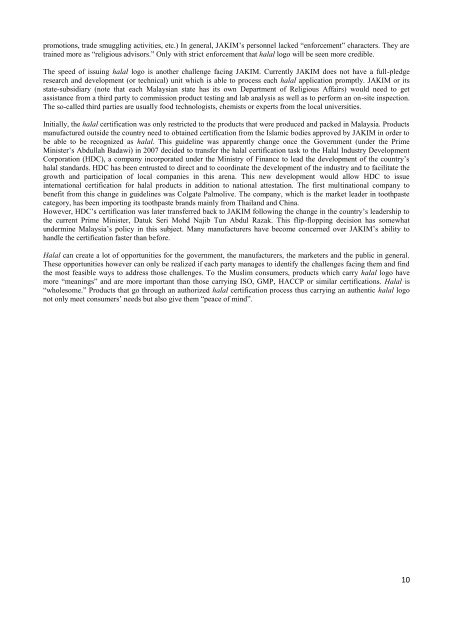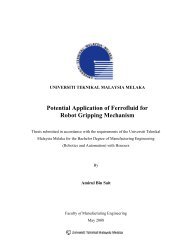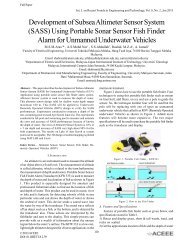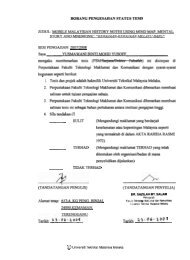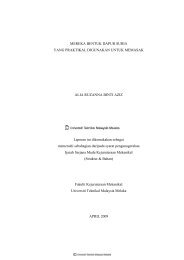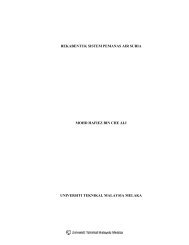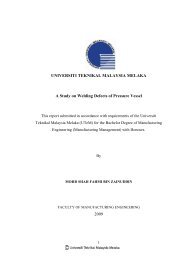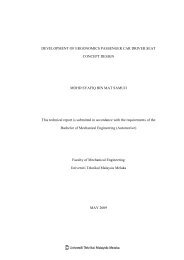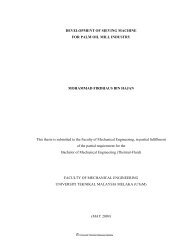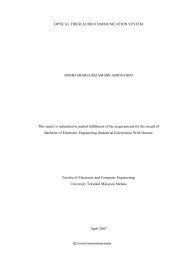- Page 1 and 2: Book of Proceedings Brand, Identity
- Page 3 and 4: Session 1.1 Emotional Branding in T
- Page 5 and 6: p.31) consumers tend to those sourc
- Page 7 and 8: Tables and figures Brand perception
- Page 9: Malaysia‘s Global Halal Hub - ―
- Page 13 and 14: Session 1.2 How is Social Media, li
- Page 15 and 16: 2. Interviews made with the adminis
- Page 17 and 18: Table-5 Facebook Members of Homeles
- Page 19 and 20: content (UGC) or even direct intera
- Page 21 and 22: Fierman, (1991) found that 47% of c
- Page 23 and 24: Multiple Dimensions of Brand Identi
- Page 25 and 26: Session 1.3 Corporate Identity, Cor
- Page 27 and 28: CSR are the ideals and ethics of co
- Page 29 and 30: Corporate Brand Identity Management
- Page 31 and 32: To study the influence of B2B relat
- Page 33 and 34: Antecedents And Consequences Of Bra
- Page 35 and 36: 22. Gurviez, P., and Korchia, M. (2
- Page 37 and 38: Non-monetary factors, such as effor
- Page 39 and 40: 23. Holbrook, M.B. (2006). Consumpt
- Page 41 and 42: Brand Extensions and Culture: The I
- Page 43 and 44: avoidance tend to prefer more infor
- Page 45 and 46: Virtual Internal Brand Communities:
- Page 47 and 48: References 1. Algesheimer, R., Dhol
- Page 49 and 50: associations based on their percept
- Page 51 and 52: shift in the psychological contract
- Page 53 and 54: 10. Berthon, P., Ewing, M., & Hah,
- Page 55 and 56: Session 2.1 Global Brand Relationsh
- Page 57 and 58: G. Brand Personality Excitement Hon
- Page 59 and 60: The Impact of Relationship Marketin
- Page 61 and 62:
‗United 2010-one for all, all for
- Page 63 and 64:
Brand Equity Trends in Top Global B
- Page 65 and 66:
Uncovering ‗Meanings‘ through A
- Page 67 and 68:
45. Melewar, T.C. and Saunders, J.
- Page 69 and 70:
Thus, from a design perspective, we
- Page 71 and 72:
Keywords Brands, marketing, meaning
- Page 73 and 74:
How Important is the Brand Name Ele
- Page 75 and 76:
References 1. Aaker, D. (1991). Man
- Page 77 and 78:
Simon Cowell and Branding the X Fac
- Page 79 and 80:
Dead or Living: Which Celebrity To
- Page 81 and 82:
Reference 1. Bagozzi, R.P. & Yi, Y.
- Page 83 and 84:
has been adopted and within this an
- Page 85 and 86:
Organizational Factors Contributing
- Page 87 and 88:
examine and reconcile existing lite
- Page 89 and 90:
Effects of Corporate Social Respons
- Page 91 and 92:
15. Morsing M, & Schultz M. (2006).
- Page 93 and 94:
1989). But if the information avail
- Page 95 and 96:
An Inquiry into Corporate Heritage
- Page 97 and 98:
3. Balmer, J. M. T., & Greyser, S.
- Page 99 and 100:
Research questions and methodology
- Page 101 and 102:
Building Corporate Reputation: A Di
- Page 103 and 104:
Session 3.1 Financial vs. Consumer-
- Page 105 and 106:
For indicating brand equity, one of
- Page 107 and 108:
Financial Brand Valuation: an exper
- Page 109 and 110:
Figure 1 Religiously Motivated Cons
- Page 111 and 112:
I Don‘t Like It! - Understanding
- Page 113 and 114:
Session 3.2 Advertising Agency Empl
- Page 115 and 116:
applications of the Repertory Test
- Page 117 and 118:
The Life Cycle of Mavens Lynne Free
- Page 119 and 120:
Exploring the relationship between
- Page 121 and 122:
internal branding process. Internal
- Page 123 and 124:
proper branding strategy. With the
- Page 125 and 126:
Profiling the Image of Urban Busine
- Page 127 and 128:
Finally, the paper confirms the cau
- Page 129 and 130:
Table 3 Image differences according
- Page 131 and 132:
associated with the brand‖ (Aaker
- Page 133 and 134:
Figure 1 - Number of adjectives sel
- Page 135 and 136:
Figure 5 - Main attributes of a gol
- Page 137 and 138:
Empirical Studies For both studies,
- Page 139 and 140:
Figure 2: Perception of the City of
- Page 141 and 142:
Co-branding places? Andrea Lucarell
- Page 143 and 144:
12. Lucarelli, A., & Berg, P. O. (2
- Page 145 and 146:
the place brands, as has been showe
- Page 147 and 148:
Session 3.4 Innovation and Entrepre
- Page 149 and 150:
The interviews were conducted in th
- Page 151 and 152:
Country-of-Origin Effects on Brand
- Page 153 and 154:
7. Kaynak, E., Kucukemiroglu, O. &
- Page 155 and 156:
Results The demographic profile ind
- Page 157 and 158:
use games consoles (Childwise, 2001
- Page 159 and 160:
Plenary Session 2 Brand Performance
- Page 161 and 162:
Uncles, M.D. & Kwok, S. (2008). Gen
- Page 163 and 164:
Brand Management Framework Empirica
- Page 165 and 166:
Coneptualising Branding in Indian P
- Page 167 and 168:
characteristics could be zeroed upo
- Page 169 and 170:
Concentrating on the actual practic
- Page 171 and 172:
ooking attractive in greater detail
- Page 173 and 174:
Session 7.2 Brand Personification a
- Page 175 and 176:
Importance of Country Image to Mega
- Page 177 and 178:
Table 1: Evaluative Responses for t
- Page 179 and 180:
To be Similar or Unique? Implicatio
- Page 181 and 182:
Brown, T. J., Dacin, P. A., Pratt,
- Page 183 and 184:
A brand-driven strategy oriented to
- Page 185 and 186:
Rheingold, H. (1993). The Virtual C
- Page 187 and 188:
A Framework for Public Sector Brand
- Page 189 and 190:
Conclusion Public sector organisati
- Page 191 and 192:
A strategic investigation into the
- Page 193 and 194:
There are also some changes in term
- Page 195 and 196:
Brand Hypocrisy Sanne Frandsen, Cop
- Page 197 and 198:
Table 1: Empirical Findings Theory
- Page 199 and 200:
Brand Governance in Social Networki
- Page 201 and 202:
Determinants Brand Orientation Va
- Page 203 and 204:
When Individual Experience becomes
- Page 205 and 206:
Impact of Storytelling on Consumer
- Page 207 and 208:
The Role of Communication in Establ
- Page 209 and 210:
Culture‘s Influence on Consumer P
- Page 211 and 212:
+ Top-Down Dynamic between Luxury F
- Page 213 and 214:
Analysis and results We assessed th
- Page 215 and 216:
An Exploration of Own Brand Retaile
- Page 217 and 218:
11. ETI 2010. Ethical Trading Initi
- Page 219 and 220:
When investigating unique significa
- Page 221 and 222:
Session 8.2 Closing the Gaps - the
- Page 223 and 224:
accomplishing reality rather than d
- Page 225 and 226:
Reddy, 1998, p.40). As a result, br
- Page 227 and 228:
Figure 2: Doves Real Beauty Billboa
- Page 229 and 230:
Literature review, as a complete re
- Page 231 and 232:
Segmenting McDonalds: Measuring Bra
- Page 233 and 234:
A simple eyeballing of the segment
- Page 235 and 236:
Segment 2 Segment 3 Segment 4 235
- Page 237 and 238:
Session 8.3 Brand Attitudes and the
- Page 239 and 240:
when preceded with the related conc
- Page 241 and 242:
What keeps smokers from quitting? U
- Page 243 and 244:
Table 1: Description of the cigaret
- Page 245 and 246:
Exploring differences in product at
- Page 247 and 248:
Based on the results some general c
- Page 249 and 250:
Data was collected by independent j
- Page 251 and 252:
Sonic branding: A review of literat
- Page 253 and 254:
How is green seen? Exploring the im
- Page 255 and 256:
were in evidence. The inability to
- Page 257 and 258:
Generally speaking, people use exte
- Page 259 and 260:
How Retail Banks Use Atmosphere to
- Page 261 and 262:
Actually, we don‘t feel constrain
- Page 263 and 264:
Introduction Reputation and Financi
- Page 265 and 266:
Chun, R. & Davies G. (2009). Employ
- Page 267 and 268:
Identity, Reputation and Organizati
- Page 269 and 270:
Introduction Factors Affecting Bran
- Page 271 and 272:
A quiet important approach then bec
- Page 273 and 274:
27. Gentry, C.R., ―Building on Br
- Page 275 and 276:
Together these issues have resulted
- Page 277 and 278:
elations. If the contact persons tr
- Page 279 and 280:
How do you Really Know? Exploring B
- Page 281 and 282:
Originality/value The psychology li
- Page 283 and 284:
asked ―did you see any of these c
- Page 285 and 286:
expressivity (Ω experts = 0,96 p
- Page 287 and 288:
Next are brand associations, also r
- Page 289 and 290:
Table 1: Selection of variables, it
- Page 291 and 292:
Special Session Issues in Brand Gov
- Page 293 and 294:
A Competance based Brand: Meaning a
- Page 295 and 296:
Session 12.4 Special Session Topic:
- Page 297 and 298:
Brand Meaning Co-Creation of Newcom
- Page 299 and 300:
Leonor Vacas de Carvalho, Évora Un
- Page 301:
Ronaldo Schutz, University of the A


